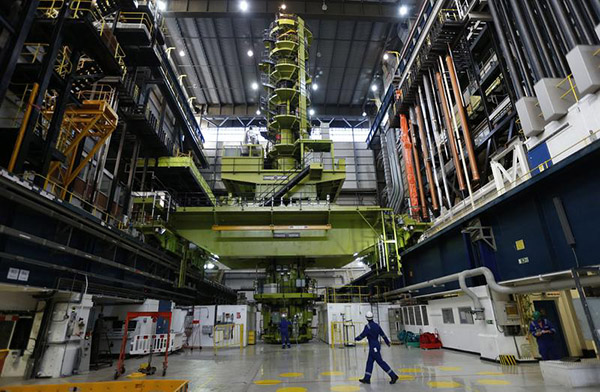 |
|
An employee walks through the charge hall inside EDF Energy's Hinkley Point B nuclear power station in Bridgwater, southwest England in this file photograph dated December 13, 2012. [Photo/Agencies] |
UK nuclear industry experts have high expectations for forthcoming nuclear discussions between the United Kingdom and China during British Chancellor of the Exchequer George Osborne's visit to China, which started on Sunday.
They are hoping his visit will facilitate a final investment decision on the UK's planned Hinkley Point nuclear power station, delayed due to an investment shortfall after France's Areva withdrew its 15 percent stake.
In addition, they hope that discussions will begin on Bradwell, a nuclear power plant that is still in the early planning stages but is likely to be built using indigenous third-generation Chinese technology. If successful, it will be the first time Chinese nuclear technology is used to build a plant in a developed economy.
Led by France's EDF Energy, the 24.5 billion pound ($37.6 billion) Hinkley Point nuclear plant, to be sited in western England, will have investment from two Chinese nuclear companies, China General Nuclear Power Group and China National Nuclear Corp.
"The delays in reaching that Final Investment Decision point have been frustrating, and costly, so an ideal outcome would be clarity on the way forward to enable Chinese participation, whilst bringing closure to the otherwise open-ended negotiation phase," said Tony Ward, UK head of power and utilities at Ernst & Young.
Christopher Bovis, a business law professor at the University of Hull, said he believes both the Hinkley Point and Bradwell nuclear projects will materialize, despite the delays. "China and its nuclear industry are in the forefront of such opportunities and should take every single one of them."
Bovis said providing access for Chinese companies to participate more in the technology and supply chain of Hinkley Point is important for the Chinese nuclear industry's internationalization.
"It is imperative that Chinese firms participate in as many supply chains as possible for nuclear facilities in the UK, and also in the EU and the rest of the world. The Chinese government must assist with market access issues and allow all diplomatic and commercial doors to be opened for such deals," he said.
Still in its early stages, the Bradwell project is expected to appoint a partner before 2017, so work can start on the facility in the following decade.
General Design Assessment approval is currently being sought in the UK for Chinese nuclear technology, and once the relevant documents are submitted it could take about four to five years for the assessment to finish.
In addition to the GDA process, Chinese companies also need to build a team capable of operating a nuclear site, going through all the planning and environmental aspects and approvals, creating a detailed design and contracting work to suppliers, creating grid connection construction and financing the project, Ward said.
"Our chancellor has said that we can't wait forever for Hinkley Point, and he is going to China. He is signaling as far as he can that the possibilities to build with China are going up the agenda rapidly," said Keith Burnett, vice-chancellor of the University of Sheffield. "We thought if we work with a company like EDF, which will still be important, we were going with a capability that's more rapid, but they have signaled delays, so now there will be a revaluation of the options, and one option is why not go with the Chinese build."
In the process of Chinese nuclear firms' localization, many British nuclear industry supply chain companies want to increase their involvement with Chinese nuclear technology, with the hope of remaining part of the Chinese nuclear technology supply chain in the future as China builds nuclear plants in other developed economies.
"China and the UK complement each other's strengths in nuclear capability and this could prove to be a successful long-term partnership between UK and Chinese companies. As the largest growing nuclear nation and with experience across the whole fuel cycle, China can create commercial and economic benefits both in China and third markets by working with UK firms," said Adrian Bull, director of external relations at the UK's National Nuclear Laboratory.
"We, along with other UK companies, are keen to use our experience and knowledge to support Chinese companies who are looking to navigate their way through the UK's regulatory, planning and procurement processes and manage any concerns the public or other stakeholders may have of safety, security and overall public opinion," said Bull.
The UK's Nuclear Industry Association has also voiced support for China's participation in the UK's nuclear sector, adding that its development in the UK is crucial for the country's energy security.
"The UK and China have a long-standing bilateral agreement to cooperate on the peaceful use of nuclear power. The chancellor will be joined by a number of British companies, and it is important that UK and Chinese companies collaborate to deliver new nuclear in the UK and provide the opportunity for UK companies to export their knowledge, goods and services to China," said John Hutton, chairman of the Nuclear Industry Association.